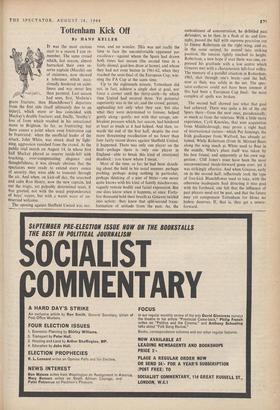Tottenham Kick Off
By HANS HELLER IT was the most curious start to a season I can re- member. The same crowd which, last season, almost barracked their own re- serve captain (Marchi) out of existence, now showed a tolerance which occa- sionally bordered on saint- liness and was never less than parental. Last season
had seen, first, Medwin's grave .fracture; then Blanchflower's departure from the first side (itself ultimately due to an injury), which more or less coincided with Mackay's double fracture; and, finally, 'Smithy's' loss of form which resulted in his sensational move to Brighton. So far, so frustrating; but there comes a point where even frustration can be frustrated: when the unofficial leader of the attack, John White, was struck dead by light- ning, aggression vanished from the crowd. At the public trial match on August 14, in whose first half Mackay played as reserve inside-left with touching, over-compensating elegance and thoughtfulness, it was already obvious that the spectators were ready to extend every ounce of security they were able to transmit through trhe air. And when, on kickoff day, the seasoned and calm Ron Henry, now the new captain, led out the tragic, yet palpably determined team, it Was greeted, not with the usual preponderance of boys' voices, but with a warm wave of un- reserved welcome.
The opening against Sheffield United vc ner- vous, and no wonder. This was not really the time to face the uncomfortable opponent par excellence—against whom the Spurs had drawn both times last season (the second time in a fairly dismal, goal-less draw at home), and.whom they had not even beaten in 1961-62, when they reached the semi-final of the European Cup, win- ning the FA Cup at the same time.
Up to the eighteenth minute, Tottenham did not, in fact, achieve 'a single shot at goal, nor force a corner until the thirty-sixth—by which time United had secured three. Yet potential superiority was in the air, and the crowd, patient, applauding not only what they saw, but also what they were determined to foresee, helped gently along—gently, not with that savage, am- bivalent pressure which, last season, had hindered at least as much as it had helped. And then, to- wards the end of the first half, despite the ever more threatening recollection of no fewer than four fairly recent draws against Sheffield United, it happened. There was only one player on the field—perhaps there is only one player in England—able to break this kind of emotional deadlock : you know whom I mean.
Most of the time, so far, he had been slouch- ing about the field in his usual manner, perhaps probing, perhaps doing nothing in particular, perhaps thinking of a pint of bitter—one never quite knows with his kind of faintly mischievous, vaguely remote bodily and facial expression. But one does know when it happens, at once. Forty- five thousand held their breath as Greaves twirled into action: they knew that split-second trans- formation of attitude from the past. As, the
embodiment of concentration, he dribbled past defenders, as he then, in a flash of in- and fore- sight, passed the ball with supreme precision out to Jimmy Robertson on the right wing, and as, in the same second, he moved into striking position, the tension rightly reached its height. Robertson, a new hope if ever there was one, ex- pressed his gratitude with a low centre which Greaves met with a characteristic left-foot volley. The memory of a parallel situation in Rotterdam, 1963, shot through one's brain—and the ball, now as then, was safely in the net. The spec- tator-catharsis could not have been intenser if this had been a European Cup final: the most complex of spells was broken.
The second half showed just what that goal had achieved. There was quite a bit of the old Spurs there—from the new ones, paradoxically, as much as from the veterans. With a little more experience, Cyril Knowles, that wise acquisition from Middlesbrough, may prove a right back of international stature—which Pat Jennings, the Irish goalkeeper from Watford, has already at- tained. While Robertson (from St. Mirren) floats along the wing much as White used to float in the middle, White's place itself was taken by his best friend, and apparently at his own sug- gestion: Cliff Jones's must have been the most unconventional inside-forward game ever; yet it was strikingly effective. And when Greaves, early on in the second half, reflectively took the type of free-kick BlanchfloWer used to take, with the otherwise inadequate Saul directing it into goal with his forehead, one felt that the influence of past players need not be past, and that the future may yet compensate Tottenham for blows no hubris deserves. If, that is, they get a centre- forward.


































 Previous page
Previous page